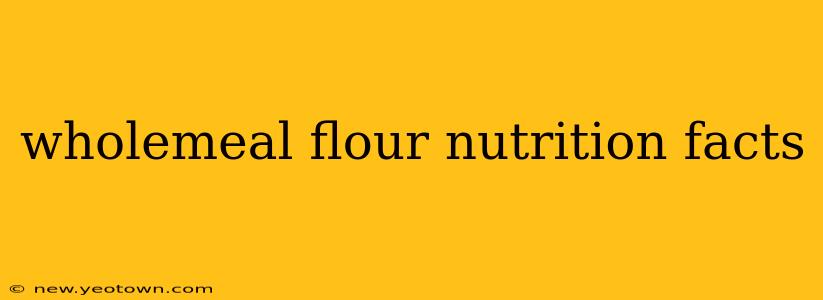The Wholesome Truth About Wholemeal Flour: A Nutritional Deep Dive
Wholemeal flour, the unrefined, unbleached sibling of white flour, has quietly become a pantry staple for health-conscious cooks. But what exactly makes it so nutritious? Let's unravel the nutritional facts surrounding this powerhouse ingredient and explore its benefits. Our journey begins with a look at its core composition, followed by answers to some frequently asked questions.
Imagine a sun-drenched field of golden wheat, swaying gently in the breeze. That's where our story starts. Unlike white flour, which undergoes a refining process that strips away the bran and germ, wholemeal flour retains all three parts of the wheat kernel: the bran, the germ, and the endosperm. This seemingly simple difference translates into a significant nutritional boost.
What are the nutritional benefits of wholemeal flour?
Wholemeal flour boasts a richer nutritional profile than its refined counterpart. This is because the bran and germ, discarded during the refining of white flour, are nutritional powerhouses. The bran is packed with fiber, contributing to digestive health and satiety. The germ, rich in vitamins and minerals, adds another layer of nutritional depth. Let's explore this further:
What are the key nutrients found in wholemeal flour?
Wholemeal flour is a good source of several essential nutrients:
-
Fiber: This is arguably the most significant difference between wholemeal and white flour. The high fiber content aids digestion, helps regulate blood sugar levels, and promotes feelings of fullness, which can aid in weight management.
-
B Vitamins: Crucial for energy production and nerve function, B vitamins (like thiamin, riboflavin, and niacin) are abundant in wholemeal flour's germ.
-
Iron: Essential for red blood cell production and oxygen transport, wholemeal flour provides a good source of iron, particularly important for vegetarians and vegans.
-
Magnesium: This important mineral plays a vital role in various bodily functions, including muscle and nerve function, blood sugar control, and blood pressure regulation. Wholemeal flour contributes to your daily magnesium intake.
-
Selenium: An antioxidant that protects cells from damage.
-
Manganese: Involved in bone health, wound healing, and metabolism.
Is wholemeal flour better than white flour?
The answer is a resounding "yes," when considering nutritional value. While white flour provides carbohydrates, wholemeal flour offers a much more comprehensive nutritional package thanks to the inclusion of the bran and germ. This translates to improved digestive health, better blood sugar control, and increased satiety.
How much wholemeal flour should I eat per day?
There isn't a set daily amount, as individual needs vary based on factors like age, activity level, and overall diet. However, incorporating wholemeal flour into your diet gradually, replacing some of your white flour consumption, is a healthy step. Aim to gradually increase your intake of whole grains, including wholemeal flour, as part of a balanced diet.
Can I substitute wholemeal flour for white flour in all recipes?
While often a direct swap, be mindful that wholemeal flour's higher fiber content can affect texture. Recipes might require slight adjustments in liquid amounts or baking time. Start by experimenting with substitutions in recipes that are less reliant on delicate textures, like bread or muffins.
What are the potential downsides of wholemeal flour?
For some individuals, the high fiber content might initially cause digestive discomfort like bloating or gas. Introducing wholemeal flour gradually into your diet can help your body adjust. Also, be aware of the higher calorie content compared to refined white flour, though the nutritional benefits outweigh this factor for most people.
Is wholemeal flour gluten-free?
No, wholemeal flour is not gluten-free. It contains gluten, a protein found in wheat that can cause problems for individuals with celiac disease or gluten sensitivity. If you require a gluten-free diet, opt for alternative flours like rice flour, almond flour, or gluten-free blends.
In conclusion, wholemeal flour is a nutritional powerhouse that deserves a prominent place in a healthy diet. Its fiber, vitamins, and minerals contribute significantly to overall well-being. By understanding its nutritional profile and incorporating it thoughtfully into your meals, you can reap the benefits of this ancient grain.

